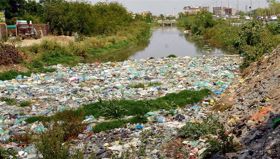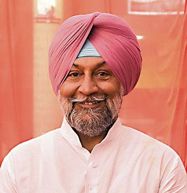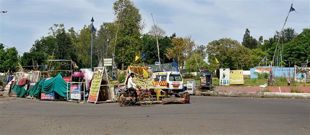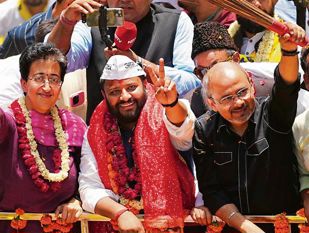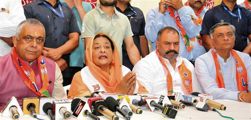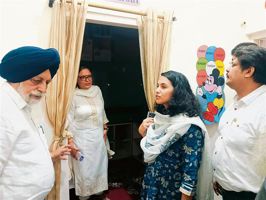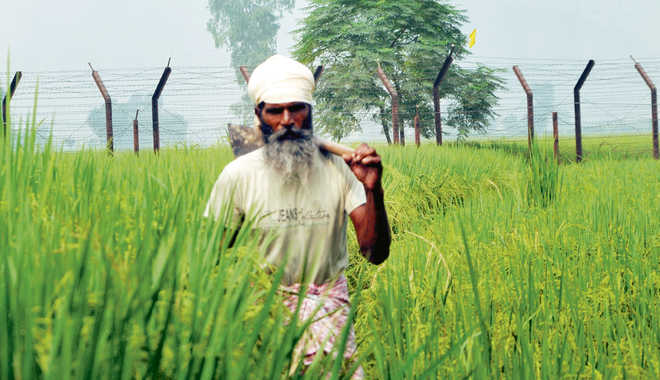
ON CARDS: A much-needed new policy for farmers. PTI
Ajay Vir Jakhar
Chairman, Punjab State Farmers & Farm Workers Commission
Punjab never had a policy for agriculture. When asked to formulate one by the government, we drafted a Farmers' Policy. The conclusion of the consultation process is an opportune time to elucidate our reasoning for drafting the policy and the way it was drafted. An essential part of a consultation process is not to limit it to the establishment or with academicians, but to reach out to as many stakeholders as possible for suggestions to improve upon it. As a first of its kind, the policy has also been published in major Punjabi newspapers and a WhatsApp number is available for people to send comments.
Establishment needs to regain trust
Within the first month of joining office, it was apparent that Punjab's financial health was in a precarious state. After visiting government offices for six months, we realised that institutions had been literally allowed to collapse. Rules were being blatantly flouted, lack of inter-department coordination, perpetual delays in decision-making, absence of will to enforce rules or initiate disciplinary action and there is poison on our plates, to name a few. Thus, we proposed a revenue-neutral policy, which is not a wish list, as many want it to be, but focuses on reforming governance, ushering in transparency, accountability and delivery of services to farmers.
The greatest hindrance to happier livelihoods in Punjab is not that what is required is not generally agreed upon, but that the establishment faces a crisis of credibility. Without regaining the trust of the people lost over a decade, the leadership will not find the courage to administer much-needed long-term critical reforms. The key element to regaining the trust is to radically improve governance and farm extension services. Many naively believe the policy goes beyond its mandate and focuses on governance reforms, but without such reforms, the farmers' policy will not be worth the paper it's written upon.
Choosing to be practical
We were advised to also suggest recommendations for the Central government, but the policy was framed specifically for Punjab. We found it more practical to list out the challenges that are beyond our control but will have a strong bearing on our lives as we have come to expect of it.
Not that laws don't exist in the state; we have many. For example, gram sabhas or innumerable welfare schemes look good on paper; it's just that they don't get implemented. Establishments are incapable of evaluating themselves; it is proposed that stakeholders be involved to do the needful. Lack of quality data in Punjab inhibits evidence-based decision-making and officers lacking the capacity to make informed choices results in execution failures and leakages. Creating a data bank on the farmers' ecosystem to enable machine learning with mandatory e-documentation will form the foundation for the desperately required change.
The policy document is in the long-term interest of the largest number of farmers, particularly the small, marginal and landless ones. A vast majority of suggestions of agriculture labour unions and unions representing small farmers have been incorporated. We took a conscious decision not to disclose views that could be attributed to particular individuals or organisations to give them space to speak freely and rein the urge to respond to publicly expressed bigoted opinion pieces.
A lot of what has been happening is wrong; we have not hesitated to state it; people need to be informed. Where we did hesitate is suggesting solutions which could be politically contentious and bitter subscriptions which are yet unpalatable for the larger public, used to populist sops. A gradual shifting is the only way. An attempt was made to make not an ideal policy that meets the expectations of every stakeholder but a pragmatic one which will be implemented.
Reaching out for suggestions
Many economists who I looked to for endorsement felt that the policy stops short of the final solution to the existential crisis of depleting groundwater and biodiversity. We would have loved to follow their advice, but after wide deliberations, we targeted to achieving a consensus to move forward quickly on as many aspects as possible rather than be bogged down in interminable discussions and not achieving anything at all. From withdrawing electricity subsidy to the better-off farmers to changing the mechanism of transferring the subsidy, the options are numerous. I am hopeful that as awareness increases amongst the farmers, leaders of farmers' unions and political parties will have the courage to stand up for their convictions.
We intentionally wrote a crisp 15-page document to not only enhance the readability factor, but also make a policy that is indicative of where we intend to be heading and not an exhaustive document. A conscious decision was made to write in a style easily understood by ordinary people and not to confuse the public with intellectual semantics. Many correctly summarised that social sustainability was bearing down too heavily on other aspects of the policy, as was intended. There is disbelief that unlike anywhere in the world, the policy avoids even citing 'increasing agriculture productivity'.
Our proposals on attaining quality food are so basic that the significance of these simply seems to have been missed. Rather than impractically pursuing things close to our hearts, the policy goes to considerable lengths to seek a reduction in the use of farm chemicals. A combination of proposals on market intelligence cell and marketing will help diversify agriculture, which in the face of conflicting factors of higher MSP for paddy and free-of-cost electricity has failed to take off.
Based on the feedback that we are fortunate to receive, a revised policy will be submitted to the government. Only after the policy is adopted by the government, can an action document be prepared by various departments. In the days to come, the farmers' commission will reach out to the people directly; the policy clearly advocates a periodical review, based on ground implementation, changing mindsets, inception of new ideas, reversing cynicism. It is not just the fear of failing to deliver that weighs heavy on us, it's also a race against time to save Punjab for future generations. A policy can be best described in the words of Sun Tzu, China's military strategist of the 6th century BC, who coined the word 'Xiaxiace' or 'the least bad option'.





















